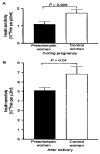Obesity, insulin resistance, and pregnancy outcome
- PMID: 20457594
- PMCID: PMC4179873
- DOI: 10.1530/REP-10-0088
Obesity, insulin resistance, and pregnancy outcome
Abstract
There has been a significant increase over the past few decades in the number of reproductive age women who are either overweight or obese. Overweight and obese women are at increased risk for having decreased insulin sensitivity as compared with lean or average weight women. The combination of obesity and decreased insulin sensitivity increases the long-term risk of these individuals developing the metabolic syndrome and associated problems of diabetes, hypertension, hyperlipidemia, and cardiovascular disorders. Because of the metabolic alterations during normal pregnancy, particularly the 60% decrease in insulin sensitivity, overweight and obese women are at increased risk of metabolic dysregulation in pregnancy, i.e. gestational diabetes, preeclampsia, and fetal overgrowth. Hence, pregnancy can be considered as a metabolic stress test for the future risk of the metabolic syndrome. In this review, we will review the underlying pathophysiology related to these disorders. Most importantly, an understanding of these risks provides an opportunity for prevention. For example, a planned pregnancy offers an opportunity to address weight control prior to conception. At the very least, by avoiding excessive weight gain during pregnancy, this may prevent excessive weight retention post partum. Finally, based on the concept of in utero programming, these lifestyle measures may not only have short- and long-term benefits for the woman but also for her offspring as well.
Figures






Lean body mass (LBM); p=0.74
Fat mass (FM); p=0.0002
Percent body fat (%BF); p=0.0001

Lean body mass (LBM); p=0.22
Fat mass (FM); p=0.0008
Percent body fat (%BF); p=0.006

References
-
- Ananth CV, Wen SW. Trends in fetal growth among singleton gestations in the United States and Canada. Seminars in Perinatology. 2002;26:260–267. - PubMed
-
- Ausman LM, Powell EM, Mercado DL, Samonds KW, el Lozy M, Gallina DL. Growth and developmental body composition of the cebus monkey (Cebus Albifrons) American Journal Perinatology. 1982;3:211–217. - PubMed
-
- Barton JR, Sibai BM. Prediction and prevention of recurrent preeclampsia. Obstetrics and Gynecology. 2008;112:359–372. - PubMed
Publication types
MeSH terms
Grants and funding
LinkOut - more resources
Full Text Sources
Medical
Miscellaneous

